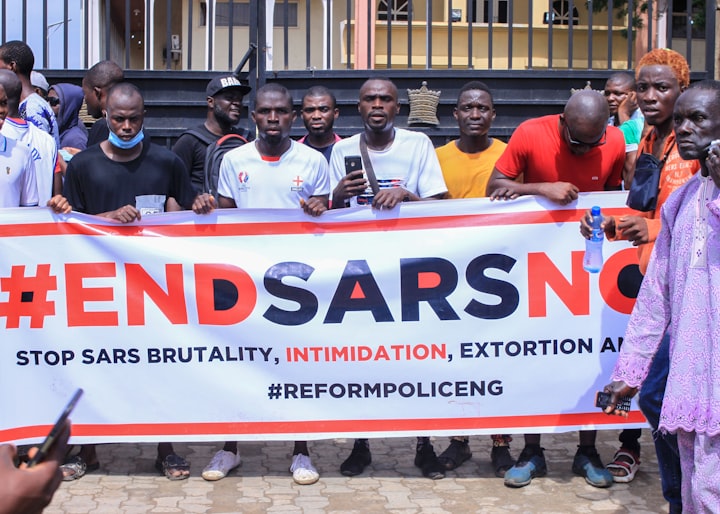Story About End SARS Protest in Nigeria
English

The End SARS protest in Nigeria was a pivotal moment in the country's history. It all began with a video that went viral on social media in early October 2020. The video showed a young man being shot by a member of the Special Anti-Robbery Squad (SARS), a controversial police unit known for its brutality and extrajudicial killings.
The video sparked outrage across Nigeria, and young people took to the streets to demand an end to police brutality. The protests started small, but they quickly grew in size and intensity as more people joined in. The protesters called for an end to SARS and for the government to address issues of police brutality, corruption, and impunity.
The government initially responded with promises of reform, but the protesters were not satisfied. They continued to march and demonstrate, and their message spread across social media and the world. Celebrities and activists from around the world voiced their support for the movement, and the hashtag #EndSARS trended on Twitter for weeks.
As the protests continued, the government's response became increasingly violent. Security forces were deployed to disperse the protesters, and there were reports of police brutality and human rights abuses. The situation escalated to the point where the military was called in to restore order, and there were reports of soldiers shooting at protesters at the Lekki toll gate in Lagos.
Despite the violence and intimidation, the protesters refused to back down. They continued to march and demonstrate, and their message resonated with people across Nigeria and the world. The movement became a symbol of hope and change, and it inspired other movements around the world to stand up against police brutality and systemic injustice.
In the end, the government was forced to listen to the protesters' demands. SARS was disbanded, and the government promised to implement police reform and address issues of corruption and impunity. The End SARS movement showed that young people have the power to effect change, and it proved that the voices of the people cannot be silenced.
The End SARS protest was particularly significant in Lagos, the commercial capital of Nigeria. Lagos is home to millions of people, and it has been the epicenter of Nigeria's economic growth in recent years. However, the city has also been plagued by issues of police brutality, corruption, and violence.
Many young people in Lagos were among the first to join the End SARS protest. They were tired of being harassed by the police, and they were frustrated with a government that seemed unwilling to address their concerns. The protest quickly spread across the city, with thousands of people taking to the streets to demand change.
The protest in Lagos was centered around the Lekki toll gate, a major thoroughfare that connects the city to its suburbs. The toll gate became a symbol of the protest movement, and it was a site of frequent clashes between protesters and security forces.
On October 20, 2020, the situation at the Lekki toll gate reached a boiling point. Security forces were deployed to disperse the protesters, and there were reports of soldiers opening fire on the crowd. The incident shocked the world, and it led to widespread condemnation of the Nigerian government.
In the aftermath of the shooting, the Lagos state government set up a judicial panel to investigate allegations of police brutality and human rights abuses. The panel has been hearing testimony from victims and witnesses, and it has exposed the extent of the abuses committed by the police.
The End SARS protest in Lagos was a turning point for the city and the country as a whole. It showed that young people have the power to effect change, and it highlighted the need for systemic reform in Nigeria. The protest also drew attention to the challenges facing Lagos, including issues of inequality, infrastructure, and governance.
In the months since the protest, there have been efforts to address these challenges. The Lagos state government has launched a number of initiatives aimed at improving the city's infrastructure and addressing issues of poverty and inequality. There are also ongoing efforts to reform the police and address issues of corruption and impunity.
Overall, the End SARS protest in Lagos was a wake-up call for the city and the country as a whole. It showed that when people come together to demand change, they can achieve it, even in the face of adversity.





Comments
There are no comments for this story
Be the first to respond and start the conversation.